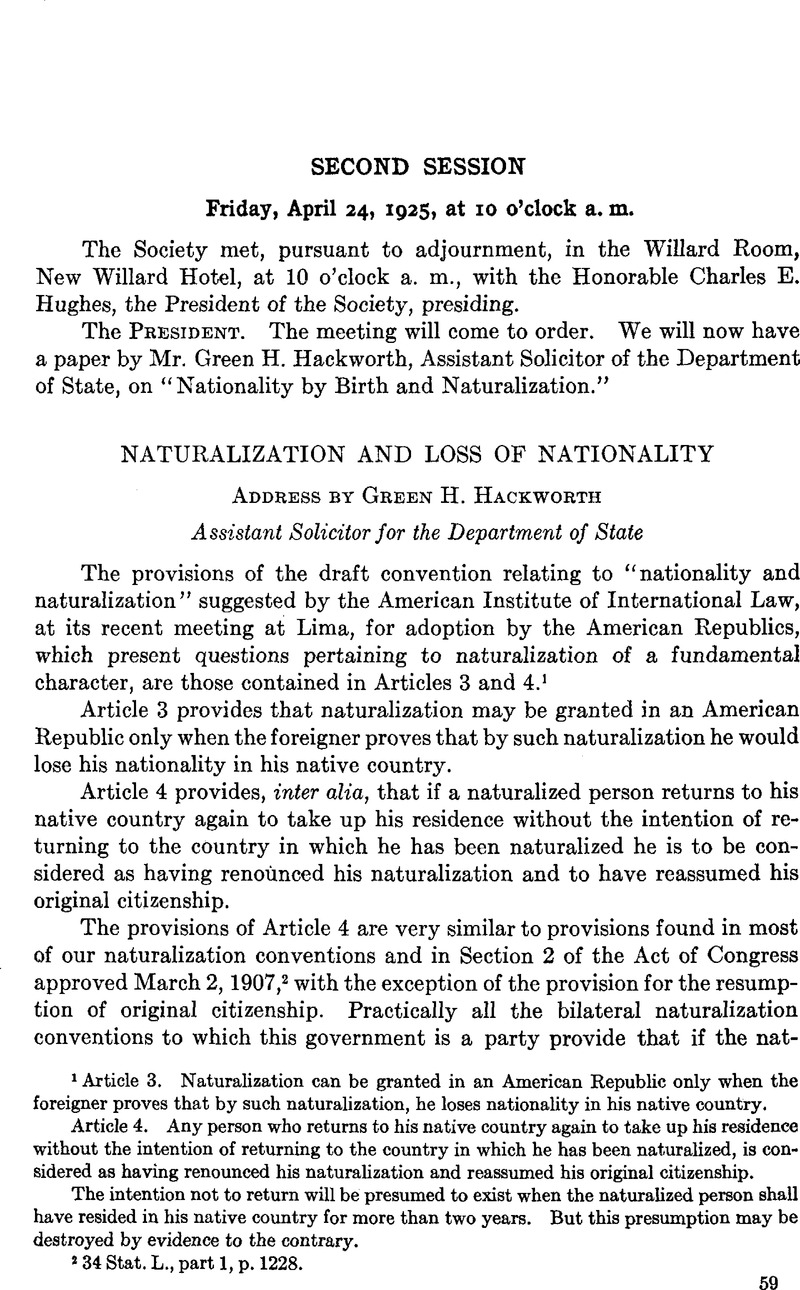No CrossRef data available.
Published online by Cambridge University Press: 27 February 2017

1 Article 3. Naturalization can be granted in an American Republic only when the foreigner proves that by such naturalization, he loses nationality in his native country. Article 4. Any person who returns to his native country again to take up his residence without the intention of returning to the country in which he has been naturalized, is considered as having renounced his naturalization and reassumed his original citizenship. The intention not to return will be presumed to exist when the naturalized person shall have resided in his native country for more than two years. But this presumption may be destroyed by evidence to the contrary.
2 34 Stat. L., part 1, p. 1228.
3 Treaty Series No. 575.
4 Annals First Congress, p. 1109; Mr. Flournoy, Yale Law Journal, 1922, Vol. 31, p. 703.
5 United States Revised Statutes, 1878, Sees. 1999-2001.
6 Vol. 1, U. S. Stat. L., p. 103.
7 Vol. 1, U. S. Stat. L., pp. 414-415.
8 1 Annals, First Cong., p. 1109, et seq.
9 Annals, Third Cong., pp. 1029-1030.
10 American Diplomacy, John Bassett Moore (1905), pp. 170-171.
11 Kent's Commentaries, 12th ed., Vol. 2, p. 53.
12 Talbot v.Janson (1795), 3 Dallas, 133.
13 II Cranch 280, IV Cranch 208.
14 3 Peters, 242.
15 Mr. Everett, Secy, of State, to Mr. Bernard, Min. to Prussia, Jan. 14, 1853, S. Ex. Doc. 38, 36 Cong., I Sess., 53-54 (Moore's Digest, III, p. 567); Mr. Marcy, Secy, of State, to Mr. Daniel, Min. to Sardinia, Nov. 10, 1855 (Moore's Digest, III, p. 569); Mr. Cushing, Atty. Gen. Oct. 31, 1856, 8 Op. 139.
16 Mr. Marshall, Secy, of State, to Mr. Humphreys, Sept. 23, 1800 (Moore, Int. Arbitrations II, 1001); Mr. Forsyth, Secy, of State, to Mr. Strobecker, Apr. 15, 1835; Mr. Wheaton, Min. to Prussia, to Mr. Knoche, July 24, 1840 (Moore's Digest III, pp. 563, 564).
17 Moore's Int. Law Digest, Vol.III, p. 566; 47 British and Foreign State Papers, 1236, 1237.
18 9 Op. Atty. Gen. 356.
19 Miss. Instructions to Prussia, 1835-1868, Vol. 14, p. 288; Senate Exec. Doc. 38, 36 Cong., 1 Sess. 132.
20 This instruction was later printed and issued in circular form as expressing the views of the government on the subject of expatriation. 51 Miscellaneous Domestic Letters, 418.
21 Moore's Int. Law Digest, Vol.III, p. 579; Moore's American Diplomacy, p. 184.
22 House Executive Document, 157, 40th Cong., 2nd Sess.; also Diplomatic Correspondence, 1866, Vol. 1.
23 U. S. Rev. Stat. Sees. 1999-2001.
24 Recognition of the principle of expatriation is implied in the multilateral convention of 1906, by which sixteen of the American Republics, including the United States, agreed: “If a citizen, a native of any of the countries signing the present convention, and naturalized in another, shall again take up his residence, in his native country without the intention of returning to the country in which he has been naturalized, he will be considered as having reassumed his original citizenship, and as having renounced the citizenship acquired by the said naturalization.” (Treaty Series No. 575; 37 Statutes at Large, 1653.)
25 Foreign Relations, 1897, p. 141; Moore's Digest, III, p. 601.
26 Ibid.,1901, p. 247; Moore's Digest, III, p. 607; Amendment No. 120 of 1913 of the Greek Law of 1885, published in the official gazette January 2, 1914.
27 Ibid.,1878, p. 458, 1879, p. 600, 1901, p. 282; Moore's Digest, III, pp. 610-616; Art. 8, Italian Law of Nationality of June 13, 1912.
28 Foreign Relations, 1893, p. 714; Moore's Digest, III, p. 700.
29 Borchard's Diplomatic Protection of Citizens Abroad, p. 543; report of board appointed by Acting Secy, of State, July 3, 1906, to make a study of citizenship questions (House Doc. 326, 59th Cong. 2nd. Sess. pp. 461, 473); Moore's Int. Law Digest, Vol.III, p. 585.
30 See Section 3 of the British Naturalization Act of 1870; also House Doc. 326, 59th Cong. 2nd Sess., quoting the Report of the Inter-departmental Committee appointed by Secy, of State for the Home Department to consider the doubts and difficulties which had arisen in connection with the interpretation and administration of the acts relating to naturalization, and to advise what amendments, if any, of the law was desirable. The report stated with respect to the Act of 1870: “It follows that the extent and character of the protection, if any, to be afforded a person in any country which, notwithstanding his acquisition of British nationality, still under its laws has a right to his allegiance, should not, and, indeed, cannot, be regulated by municipal law, but must be regulated by international comity. It is most desirable that cases of double nationality should be reduced within the narrowest limits by the adoption of the principle that naturalization in one country carries with it the loss of prior nationality; but in so far as this principle is not adopted it will be necessary to continue to act upon the rule, which is at present recognized, that when a person has a double allegiance he is under a paramount obligation to that one of the two countries in which he for the time being is.“
31 Second Report of the Provost Marshal General, December 20, 1918, p. 168.
32 Yale Law Journal, 1922, Vol. 31, No. 7, p. 717.
33 Foreign Relations of the United States, 1873, p. 1234.